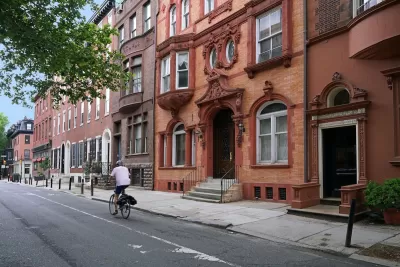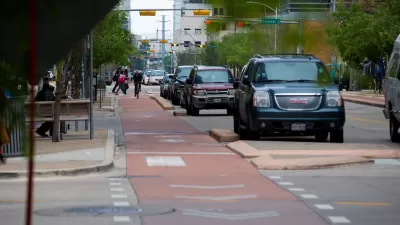The city council passed a bill that would raise penalties and eliminate a grace period for drivers who stop in bike lanes.

A new Philadelphia bill passed by the City Council would raise penalties for drivers who park or stop in bike lanes. If signed by the mayor, the law would increase fines to $125 in Center City and University City and $75 in other neighborhoods and remove a 25-minute grace period, reports Michaela Althouse for Philly Voice.
The law is part of the city’s effort to increase safety for cyclists. “Those who support the stricter laws say when a vehicle is stopped in a bike lane, it forces cyclists to swerve into traffic, endangering them. They also argued that being able to temporarily park directly in front of a home is a luxury that doesn't exist for many residents. ”
According to Althouse, “The bill notably does not include installing concrete barriers, another proposed bike safety solution that's been hotly contested. But the city's Office of Transportation and Infrastructure Systems has said it plans to add them at Spruce and Pine streets, subject to community approval.”
FULL STORY: Artificial Intelligence in Cities Trend Report 2024

Manufactured Crisis: Losing the Nation’s Largest Source of Unsubsidized Affordable Housing
Manufactured housing communities have long been an affordable housing option for millions of people living in the U.S., but that affordability is disappearing rapidly. How did we get here?

Americans May Be Stuck — But Why?
Americans are moving a lot less than they once did, and that is a problem. While Yoni Applebaum, in his highly-publicized article Stuck, gets the reasons badly wrong, it's still important to ask: why are we moving so much less than before?

Using Old Oil and Gas Wells for Green Energy Storage
Penn State researchers have found that repurposing abandoned oil and gas wells for geothermal-assisted compressed-air energy storage can boost efficiency, reduce environmental risks, and support clean energy and job transitions.

Updating LA’s Tree Rules Could Bring More Shade to Underserved Neighborhoods
A new USC study finds that relaxing Los Angeles’ outdated tree planting guidelines could significantly expand urban tree canopy and reduce shade disparities in lower-income neighborhoods, though infrastructure investments are also needed.

California's Canal Solar Projects Aim to Conserve Resources and Expand Clean Energy
California’s Project Nexus has begun generating electricity from solar panels installed over irrigation canals, with researchers and state agencies exploring statewide expansion to conserve water and boost clean energy production.

HHS Staff Cuts Gut Energy Assistance Program
The full staff of a federal program that distributes heating and cooling assistance for low-income families was laid off, jeopardizing the program’s operations.
Urban Design for Planners 1: Software Tools
This six-course series explores essential urban design concepts using open source software and equips planners with the tools they need to participate fully in the urban design process.
Planning for Universal Design
Learn the tools for implementing Universal Design in planning regulations.
Heyer Gruel & Associates PA
City of Moreno Valley
Institute for Housing and Urban Development Studies (IHS)
City of Grandview
Harvard GSD Executive Education
Salt Lake City
NYU Wagner Graduate School of Public Service
City of Cambridge, Maryland





























